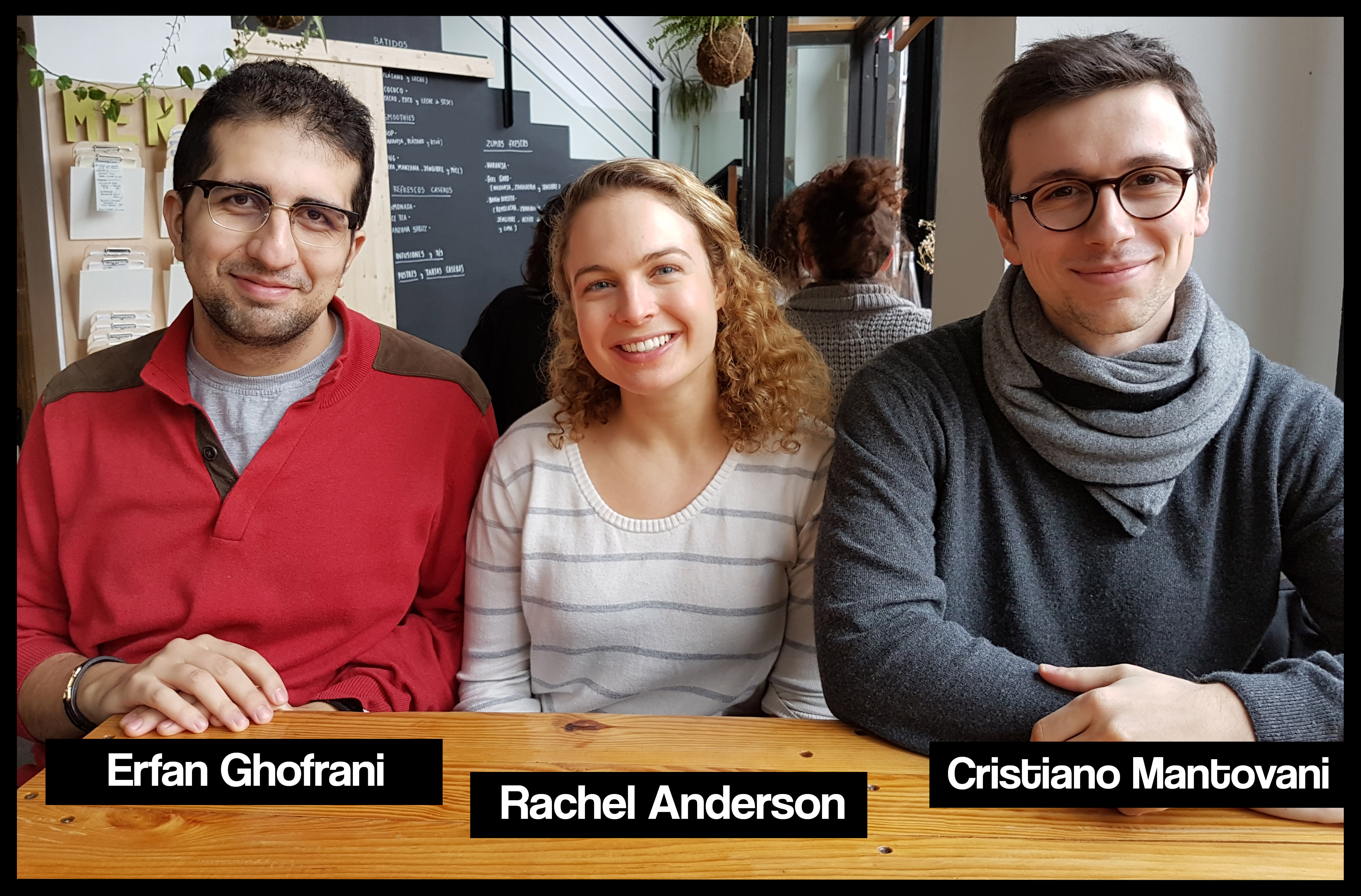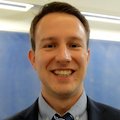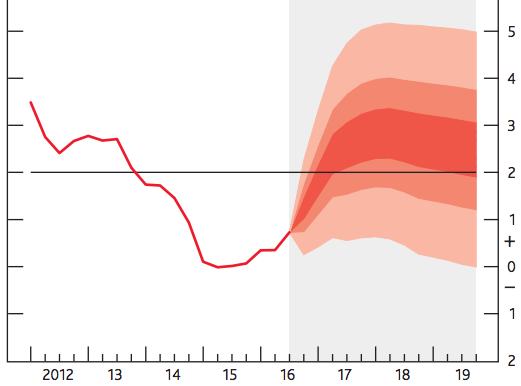
In the last few months, several BGSE students have gotten PhD offers. The Voice team has met up with a few of them to find out more about their (academic) experience, and just life in general. This post presents the full transcript of the interview with Erfan Ghofrani, Rachel Anderson and Cristiano Mantovani, interviewed by one of our editors, Demas.
What were you doing before you started the Master’s programme at the BGSE?
Erfan: I did Electrical Engineering as my major at Sharif University, in Tehran, Iran. I also minored in Economics. I took a couple of courses in Economics at UC Berkeley in the summer of 2015.
Rachel: Before coming to BGSE, I was studying at Duke University, where I majored in Economics and Computer Science. I also spent some time during my undergraduate summers studying Turkish and Arabic abroad.
Cristiano: I was working at UniCredit for about 2 years in Milan, Italy, as a risk analyst in the banking sector. Before that, I graduated from Bocconi University with a Master’s in Economics and Social Sciences. I did my Bachelor’s in Business Administration at the University of Parma, which is close to my hometown.
Did you accept the offer of entering the UPF’s PhD programme? Why? Did you apply to other PhD programmes? Why?
Erfan: Yes, I have accepted the offer. Before Trump’s executive order regarding Iran, and before coming to Barcelona, I wanted to do my PhD at one of the top ten universities in the US. However, after living in Barcelona and pursuing my education at the BGSE, I have had a change in perspective. In my opinion, UPF is a great university with a renowned faculty, and Barcelona is also a really amazing city to live in.
Rachel: While it was tempting, I did not eventually accept the offer from UPF. Instead, I’ve decided to study in the United States, where I’m from. Macroeconomics does pique my interest, but I’m more passionate about other fields, which is why I’ve applied to schools that I think will better cater to my interests – in applied microeconomics and econometrics. I’m happy to say that I’ve been accepted by Princeton University, and will likely be doing a PhD there.
Cristiano: Yes, I accepted the offer from the UPF. I had only applied to one programme. Fortunately, I did not have to apply to other programmes as I was notified of the admissions decision rather early. I accepted the offer mainly because I was enticed by the Macroeconomics faculty members. Moreover, I really enjoy living in Barcelona.
What have you found most challenging about studying a Master’s at the BGSE?
Erfan: Living alone, away from family members, is difficult and it will become more challenging if one does not understand Catalan and Spanish as one might not be able to communicate well with people outside the university. My undergraduate education was taught entirely in Persian, and hence the English programme has been a little challenging for me. However, it has helped me a lot with my English.
Rachel: At first, the most challenging thing about studying at BGSE is living in Barcelona. Barcelona is such an incredible city, with such great weather, and it has taken some time to learn how to avoid distractions and be productive! I’m glad that I’ve been able to strike a balance between working hard and playing hard.
Cristiano: In the beginning, it was difficult to get back into the life of a student, as I had been working for some time. The biggest challenge was more of a mental adjustment, and I had to keep up with the fast pace of university life (besides the courses themselves). The free weekends seem to have become something of the past. However, I really enjoy what I am doing, so that keeps me going.
Name someone whose work has inspired you. Please elaborate.
Erfan: My BSc thesis and project supervisor, Dr. Madanizadeh, inspired me a lot. I found it interesting how he had done the same thing as I was doing – Electrical Engineering at Sharif. Thereafter, he went on to read Mathematics at Stanford and Economics at Chicago. After graduation, he came back to Iran, unlike most of the Iranian students, who usually stay in the US. It seems to me that he loves Iran and wants to help fellow Iranians by improving the economic situation of the country. Now, he is the Head of the Modelling Group at the Money and Banking Research Institute of the Central Bank of Iran, as well as Assistant Professor of Economics at Sharif University.
Rachel: I am most inspired by Paul Krugman as a communicator. I love how he is able to convey complex economic ideas in a way that is comprehensible to his audience. I am also inspired by the work of professors at the BGSE like Robin Hogarth, who has made huge contributions to the field of behavioural decision-making.
Cristiano: My thesis advisor at Bocconi, Antonella Trigari, really inspired me because of her work on unemployment dynamics. She has adopted a macroeconomic perspective, and when I was working under her supervision, it seemed obvious to me that I should study Economics at the graduate level. These are fundamental topics in every part of the world, and are especially pertinent in countries in which the unemployment rate has been increasing constantly. For example, youth unemployment in Italy has soared to 40%, and this has made me want to unravel the dynamics of unemployment.
What are/will be your research interests? Please describe them in two to three sentences.
Erfan: We have seen dire economic situations in Iran in the last decades. An inflation rate of 40%, stagflation, as well as the Dutch disease are issues that one might have heard about in theoretical texts, but we Iranians have experienced them in reality. These have destroyed the lives of millions of people. My interests lie in monetary policies and macroeconomic policies through which I can better understand the causes of the aforementioned predicaments and I hope that we can prevent them in the future.
Rachel: Right now, I’m most excited about applied microeconomics and econometrics, as well as behavioural economics. I’m interested in pursuing projects that address real-world economic problems and have the potential for positive social impact. One good example would be studying labour market trends for women in Turkey, which is the topic of my undergraduate thesis.
Cristiano: Currently, I would really like to study the macroeconomics of labour as well as the interaction between fiscal and monetary policies. However, I don’t want to constrain myself too much, especially at the beginning of the PhD – I am not ruling out the possibility of working perhaps in applied microeconomics, such as public economics or studies on inequality dynamics.
What advice would you give to future PhD applicants?
Erfan: I would advise potential applicants to work hard in mathematical methods as these are essential for a PhD in Economics. Moreover, reading a variety of papers about Economics is always useful as there is a lot to learn from them. Also, for applicants to universities in Spain, it would be good to start learning Spanish if you don’t already speak it.
Rachel: Be patient. Some of the material won’t be easy to understand right away; but if you’re resilient you will learn a lot.
Cristiano: I have no particular insights with regard to this, but studying in groups and sharing ideas and comments has been particularly helpful for me. Moreover, I would also say: don’t be afraid to speak to professors during office hours – they are always happy to reply to you, and more often than not, they understand your needs and concerns.
Finally, what are your future aspirations?
Erfan: I would like to be a professor and researcher in Macroeconomics. In addition, my ambition is to help countries with poor economic performance.
Rachel: Personally, I would like to be a professor at an international research university like UPF, or my alma mater, Duke University. I would be excited to teach Economics.
Cristiano: My ideal path would be to pursue a career in academia after the PhD, but a job at a central bank, a think-tank, or in the policy sector would all be equally desirable outcomes. When it comes to where I would like to work, I still don’t know, but leaving Barcelona won’t be easy at all, as I have made really good friends over the past few months.

 Editor’s note: In this post, Greg Ganics (Economics ’12 and PhD candidate at UPF-GPEFM) provides a non-technical summary of his job market paper, “Optimal density forecast combinations,” which has won the
Editor’s note: In this post, Greg Ganics (Economics ’12 and PhD candidate at UPF-GPEFM) provides a non-technical summary of his job market paper, “Optimal density forecast combinations,” which has won the 
